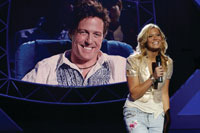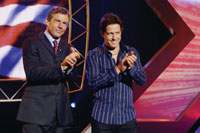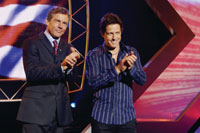The first thing you should know about American Dreamz, the new film from writer/director Paul Weitz, is that it’s a satire. It cannot, therefore, be held accountable for gaping plot holes, implausible set-ups, Iraqi terrorists who speak to each other in accented English, presidential figures who are more lobotomized than caricatured, and truly dreadful American Idol pop song parodies. All of the above are an intentional part of the fun. You should also know, however, that American Dreamz‘s brand of satire is closer to Saturday Night Live than Oscar Wilde. Writer/director Paul Weitz hits his targets mostly because they’re too wide to miss, and there’s nothing particularly nuanced about his portrayal of (North) America’s obsession with celebrity (and apathy about most everything else). Still, cheap or otherwise, there are plenty of laughs. American Dreamz ain’t subtle, but it’s amusing.
The First Act careens between four main stories, all critical to the set-up of the film. In the opening scenes we are introduced to Martin Tweed, the host, judge and producer of the singing contest American Dreamz—the most watched television series in America. His wardrobe (and matching ego) are strikingly Seacrest-esque, while his acerbic wit would make Simon Cowell proud. Hugh Grant (last paired with Weitz in the stellar About a Boy) excels at playing charismatic, self-loathing manipulators, and he hits the mark once again as the charming and miserable Tweed. He informs his staff that he is bored of the usual contestants and orders them to find, among other things, an “Arab” and a “Jew” to compete on the show.

The President (Dennis Quaid) makes a guest appearance as a judge on ‘American Dreamz,’ hosted by Martin Tweed (Hugh Grant)
Meanwhile, at an Iraqi terrorist training camp (and video shoot) we are introduced to a hapless, show-tune loving trainee named Omer. Though seeking retribution for his mother’s death in an American bombing, Omer’s heart is clearly more tender than vengeful, and his superiors quickly determine that he has little aptitude for the terrorist business. They send him to live with some distant relatives in Orange County, telling him to await “activation” once he reaches America. The plan is really to leave him there in obscurity, but that changes when his unanticipated success on American Dreamz puts him in a uniquely ideal position to strike a deadly blow to the heart of American culture.
The third opening story involves the President of the United States, played by Dennis Quaid as a lovable idiot who, on the day of his reelection, makes the tragic mistake of reading a newspaper for the first time in years. Suddenly paralyzed by the complexity of the situations he’s been asked to manage (which seemed black and white when other members of his staff handled the research), President Staton refuses to meet with the press and remains sequestered in his room, poring over books and discovering troubling new information. When rumors of a presidential breakdown get out of hand, Staton’s Svengali-like Chief of Staff (a chrome-domed Willem Dafoe) sets up a media tour to repair the damage. First stop: Celebrity judge on the season finale of American Dreamz.
But wait, there’s more! The fourth central figure in the film is Sally Kendoo (a riveting Mandy Moore), a young Ohio Karaoke star who is as winsome as she is ruthless in her quest to win the American Dreamz singing contest. Tweed immediately recognizes Sally’s duplicity (including her willingness to exploit the unrequited affections of her war vet ex-boyfriend) and finds it attractive, setting the stage for an odd and understated romance that becomes the heart of the film.

The first thirty or forty minutes of American Dreamz cover a tremendous amount of ground and are, not surprisingly, labored. On at least three occasions the task of introducing and contextualizing so many characters seems to overtake Weitz and reduces him to the use of somewhat randomly inserted pratfalls and sight gags. Once the basic set-up is established, however, the movie begins to hit its stride, and its final hour is consistently engaging.
Though Weitz clearly sets his sights on the decline of American politics throughout American Dreamz (reminding us repeatedly that more people vote for the next singing star than they do for the next Commander-in-Chief), the satire is surprisingly toothless. As a Canadian, I find it difficult to predict how offensive some viewers may find the political humor, but it strikes me as rather benign. The real President of the United States is capable of delivering hilarious one-liners (intentional or otherwise) any day of the week; Staton’s comedic dialogue is, frankly, inferior. And though the trailer for the movie may lead viewers to expect a skewering of the presidential figure, Quaid’s president is undeniably dumb but also, ultimately, one of the most noble and decent characters in the film.

American Dreamz‘s parody of America’s cultural fixation with celebrity has a little more bite. But even here Weitz is faced with a struggle—a phenomenon like American Idol (and reality TV in general) has already become so extreme and self-parodying that there is little left to exaggerate. The best moments in the singing contest come from the interplay between Omer and his wanna-be-star-turned-manager cousin Iqbal (Tony Yalda). Yalda is a hysterical bundle of aspiration, insecurity and truly catastrophic dance moves, all of which he generously passes on to his cousin.
What is unusual about a film like American Dreamz is how likable its principle characters are, even the ones most central to the satire. Whether he means to or not, Weitz gives us enough insight into the wounded psyches of each of his players to make us care about them. He aims to cut and skewer, and he does a bit of that, in a broad, easy-target sort of way. But ultimately his ability to explore and expose human nature trumps his sarcastic agenda. In a way, this film talks out of both sides of its mouth—lampooning and loving its targets at the same time. But most viewers, I suspect, won’t mind. It’s fun to root for someone and laugh at him or her at the same time. (How else do you explain William Hung?) Maybe it’s even a part of the American Dream.
Talk About It
Discussion starters- What are the roles of sarcasm and satire in the intelligent discussion of current events? Is there a certain amount of respect due our leaders, or are all public figures “fair game”?
- American Dreamz parodies the tendency for North Americans to get more interested in a show like American Idol than in other, more important issues. Is there an element of pop culture that is out of balance in your life? Is there an important area being neglected?
- Sally gives viewers some clues about what fuels her drive for celebrity when she talks about her obesity as a child. Do you think our culture’s obsession with fame is rooted in a desire for acceptance? What are some productive ways to satisfy that desire?
The Family Corner
For parents to considerThere is one sexual situation in American Dreamz that is strongly implied but not seen. There is enough foul language to earn the film’s PG-13 rating. Some younger teens may confuse sarcastic and ironic treatments of race relations with racism – dialogue is recommended!
Photos © Copyright Universal Pictures
Copyright © 2006 Christianity Today. Click for reprint information.
What Other Critics Are Saying
compiled by Jeffrey Overstreetfrom Film Forum, 04/27/06Writer/director Paul Weitz follows up his popular corporate comedy In Good Company and the warm-hearted bachelor antics of About a Boy with something far more ambitious—American Dreamz, a satire about presidents, first ladies, American Idol, and pop culture. And while he’s not winning as many rave reviews as he did for his earlier projects, he is getting mixed reactions from the religious press.
Christa Banister (Crosswalk) writes, “If Weitz really wanted to use the film as a springboard for his opinion about the state of the world, he should’ve taken a cue from better executed, less wishy-washy satire like Wag the Dog or Election. But as a lightweight, escapist comedy for those looking for something to watch on a Friday night, this wildly uneven farce may just do the trick. Or you could save money and add it to your Netflix queue in the coming months.”
Harry Forbes (Catholic News Service) says, “There are, in fact, probably too many targets … but this is on the whole an amusing satire of fame and politics, despite some elements that on paper might raise eyebrows.” He adds, “Weitz carefully avoids most of the bad-taste pitfalls, but some may still find the terrorist business insensitive fodder for comedy. … But Weitz also underscores the paradox of how those who set out to destroy American culture can be smitten with it. On the other hand, the moderate portrayal of Omer’s relatives is one of the screen’s more positive depictions of Arab-Americans.”
Jenn Wright (Hollywood Jesus) says, “It would be nice to be able to say that, in the midst of the broad satire, Weitz offers some glimmer of hope, or some solution to the idolatrous craze that has become the American dream. Unfortunately, there is a distinct lack of anything—or anyone—acting as a positive influence. Instead, we see myriad examples of manipulation, avarice, naïveté, and willful ignorance, with very little sanity to balance the pessimism.”
Christopher Lyon (Plugged In) says, “One thing is clear after sitting through American Dreamz: If Mandy Moore could sneak on to American Idol, she’d have a real shot at winning the thing. The girl sounds good, even singing the ridiculous numbers voiced by the show’s contestants. But the film isn’t really about the singing. Unfortunately, it’s not about the laughing, either. … As a satire, the effort falls flat. The targets are too broad, the observations tired, and the jokes stale.”
Some mainstream critics are trying to forget these Dreamz, while others are giving Weitz credit for trying to write a warm-hearted political comedy.











